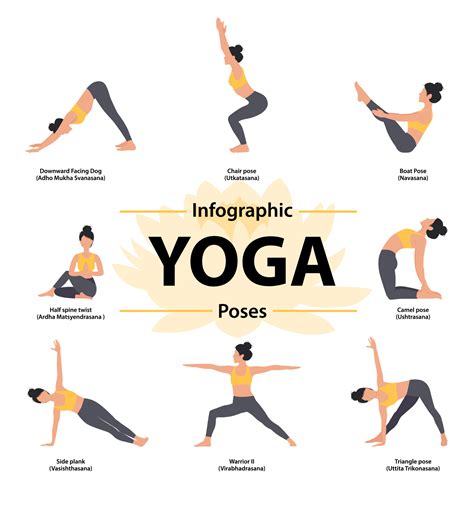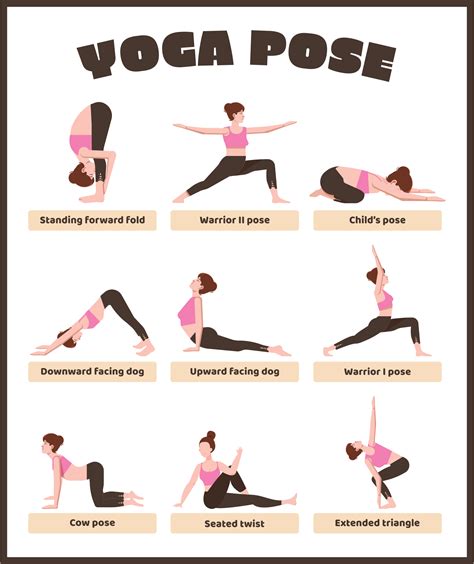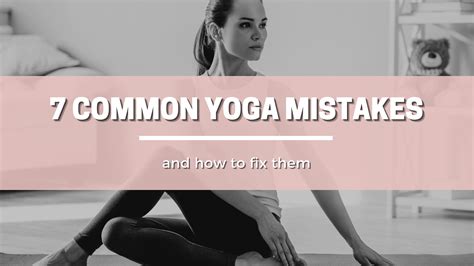Intro
Discover 5 beginner-friendly yoga poses for flexibility and balance, including foundational asanas, breathing techniques, and meditation tips for a holistic practice, perfect for newcomers to yoga and mindfulness exercises.
Yoga has become an essential part of many people's lives, offering numerous physical, mental, and emotional benefits. The practice of yoga originated in India over 5,000 years ago and has since evolved into various styles, each with its unique approach and focus. For beginners, starting a yoga practice can seem intimidating, especially with the numerous poses and techniques involved. However, with a gentle and gradual approach, anyone can embark on this journey and experience the transformative power of yoga. In this article, we will delve into the world of yoga, exploring its importance, benefits, and five beginner-friendly poses to get you started.
The importance of yoga in modern life cannot be overstated. With the increasing demands of work, social media, and daily responsibilities, stress and anxiety have become common companions for many. Yoga offers a holistic approach to managing stress, improving flexibility, and enhancing overall well-being. By incorporating yoga into your daily routine, you can experience a significant reduction in stress levels, improved sleep quality, and a boost in energy and concentration. Moreover, yoga fosters a deeper connection with your body, allowing you to tune into your inner self and cultivate a sense of self-awareness and self-acceptance.
As you begin your yoga journey, it's essential to approach it with an open mind and a willingness to learn. Yoga is not just about the physical postures; it's a practice that encompasses breathing techniques, meditation, and a philosophical approach to life. By embracing the entirety of yoga, you can experience profound transformations that extend beyond the physical realm. Whether you're seeking to improve your physical health, manage stress, or simply find a sense of calm and clarity, yoga has something to offer. With its rich history, diverse styles, and numerous benefits, yoga is an invitation to embark on a journey of self-discovery and growth.
Introduction to Beginner Yoga Poses

For beginners, it's crucial to start with poses that are foundational, accessible, and gentle on the body. These poses will help you build a strong foundation, improve your flexibility, and develop the confidence to explore more advanced practices. The following five poses are ideal for beginners, offering a comprehensive introduction to the world of yoga.
Benefits of Yoga for Beginners
When starting a yoga practice, it's essential to understand the benefits that come with it. Yoga offers numerous advantages, including improved flexibility, balance, and strength. It also enhances cardiovascular health, reduces stress and anxiety, and promotes better sleep quality. By incorporating yoga into your daily routine, you can experience these benefits firsthand and cultivate a deeper connection with your body and mind.5 Beginner-Friendly Yoga Poses

Here are five beginner-friendly yoga poses to get you started:
- Mountain Pose (Tadasana): This foundational standing pose is essential for establishing good posture, balance, and alignment. It's a great starting point for many other poses and helps to calm the mind and reduce stress.
- Downward-Facing Dog (Adho Mukha Svanasana): This pose stretches the hamstrings, calves, and spine, while also strengthening the arms and shoulders. It's an excellent pose for improving flexibility and relieving stress.
- Cobra Pose (Bhujangasana): This gentle backbend strengthens the back muscles, opens the chest, and improves flexibility in the shoulders and upper back. It's an excellent pose for improving posture and reducing stress.
- Seated Forward Fold (Paschimottanasana): This pose stretches the entire back side of the body, from the shoulders to the heels. It's an excellent pose for improving flexibility, reducing stress, and calming the mind.
- Child's Pose (Balasana): This resting pose is perfect for relaxation, stretching the back, and calming the mind. It's an excellent pose for beginners, as it allows you to rest and recharge while still experiencing the benefits of yoga.
Tips for Practicing Beginner Yoga Poses
When practicing these beginner-friendly poses, remember to:- Listen to your body and modify or rest when needed
- Focus on your breath and use it to guide you through each pose
- Engage your core and maintain good alignment to ensure safety and effectiveness
- Practice regularly to experience the cumulative benefits of yoga
- Be patient and gentle with yourself, as yoga is a journey, not a competition
Common Mistakes to Avoid in Yoga

As a beginner, it's essential to be aware of common mistakes to avoid in yoga. These include:
- Not listening to your body and pushing past pain or discomfort
- Not engaging your core and maintaining good alignment
- Not focusing on your breath and using it to guide you through each pose
- Not practicing regularly and consistently
- Not being patient and gentle with yourself, and comparing yourself to others
Yoga Props and Accessories
Yoga props and accessories can be incredibly helpful for beginners, providing support, stability, and comfort during practice. Some essential props include:- Yoga mats: Providing grip, cushioning, and hygiene
- Blocks: Assisting with alignment, depth, and modification
- Straps: Helping with flexibility, stretching, and binding
- Blankets: Offering comfort, support, and warmth
- Bolsters: Providing support, relaxation, and rejuvenation
Yoga for Stress Relief and Relaxation

Yoga is an excellent tool for managing stress and promoting relaxation. By incorporating yoga into your daily routine, you can experience a significant reduction in stress levels, improved sleep quality, and a boost in energy and concentration. Some poses that are particularly beneficial for stress relief and relaxation include:
- Child's Pose (Balasana)
- Downward-Facing Dog (Adho Mukha Svanasana)
- Seated Forward Fold (Paschimottanasana)
- Plow Pose (Halasana)
- Legs Up The Wall Pose (Viparita Karani)
Yoga and Meditation
Yoga and meditation are closely intertwined, offering a powerful combination for physical, mental, and emotional well-being. Meditation can help you cultivate a deeper sense of awareness, calmness, and clarity, while yoga can provide a physical foundation for meditation. By incorporating both practices into your daily routine, you can experience profound benefits, including:- Reduced stress and anxiety
- Improved sleep quality
- Increased focus and concentration
- Enhanced self-awareness and self-acceptance
- Greater sense of calmness and clarity
Yoga for Beginners: A Journey of Self-Discovery

As you embark on your yoga journey, remember that it's a path of self-discovery, growth, and transformation. Yoga is not just a physical practice; it's a holistic approach to life that encompasses physical postures, breathing techniques, meditation, and a philosophical approach to living. By embracing the entirety of yoga, you can experience profound benefits that extend beyond the physical realm, cultivating a deeper sense of awareness, calmness, and clarity.
Conclusion and Next Steps
In conclusion, yoga is a powerful tool for physical, mental, and emotional well-being, offering numerous benefits for beginners and experienced practitioners alike. By starting with beginner-friendly poses, listening to your body, and practicing regularly, you can experience the transformative power of yoga and cultivate a deeper connection with your body and mind. Remember to be patient, gentle, and compassionate with yourself, and don't hesitate to explore the various styles, props, and accessories that yoga has to offer.What are the benefits of yoga for beginners?
+Yoga offers numerous benefits for beginners, including improved flexibility, balance, and strength, as well as reduced stress and anxiety, and enhanced cardiovascular health.
What are some common mistakes to avoid in yoga?
+Common mistakes to avoid in yoga include not listening to your body, not engaging your core, and not focusing on your breath. It's also essential to avoid pushing past pain or discomfort and to practice regularly and consistently.
How often should I practice yoga as a beginner?
+As a beginner, it's recommended to practice yoga 2-3 times a week, with a minimum of 20-30 minutes per session. Consistency is key, so aim to practice at the same time every day or week to make it a habit.
We invite you to share your thoughts, experiences, and questions about yoga in the comments below. Whether you're a seasoned practitioner or just starting your journey, we'd love to hear from you and provide guidance and support along the way. Don't forget to share this article with friends and family who may be interested in exploring the world of yoga, and let's embark on this transformative journey together!
